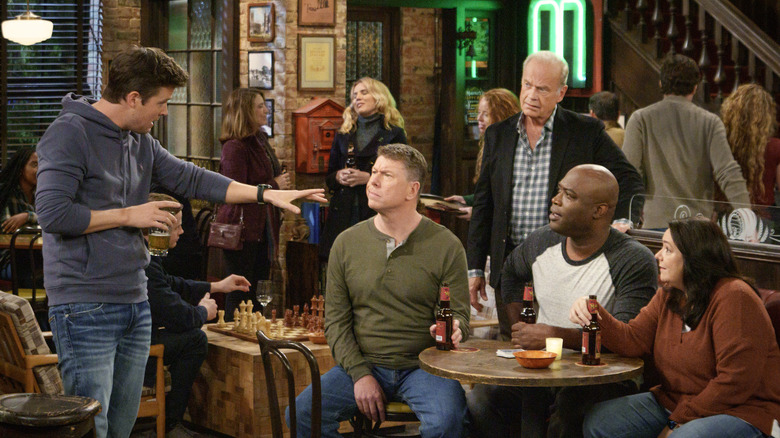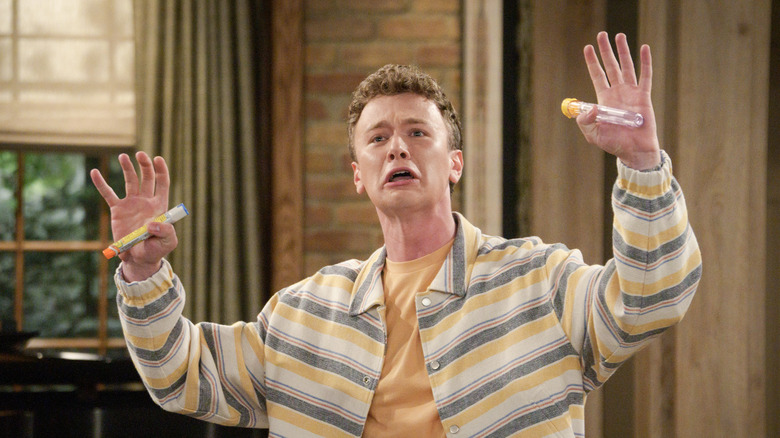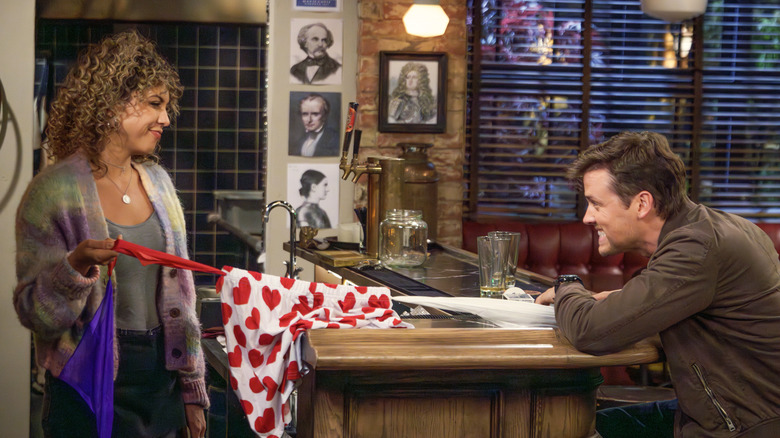The Frasier Revival Finally Reveals 'The Smartest Crane Of All,' And It's Not Who You'd Think
The Cranes might be the smartest family in TV history. At least in sitcom history. In terms of sheer brain power, the "Big Bang Theory" crew certainly have them beat, but Kelsey Grammer's Frasier, his brother Niles (David Hyde Pierce), and ex-wife Lilith (Bebe Neuwirth) — all psychologists — command a ferocious amount of cultural and academic intellect between them. Heck, add the intuitive prowess of Niles' wife Daphne (Jane Leeves) and the street smarts of the boys' father Martin (John Mahoney) into the mix and you've got a meeting at the minds that could test the very mettle of Mensa.
Across the original series' eleven seasons, Frasier's and Niles' intellects were frequently used as the immovable objects that story plots wound around, crashed into, undercut, and attempted to outpace to generate laughs. The Crane boys were so smart, so many episodes contended, that they would find themselves blithely obvious to matters of fact every other character could see, overintellectualized and thus complicated direct romantic signals, and drew the ire of "common folk" like Martin, Roz (Peri Gilpin), or the many listeners of his radio show with their smug senses of superiority. Niles' idea of the kind of reference that would endear him to those people in a season 3 episode just about sums it up: "Float like a Lepidoptera, sting like a Hymenoptera." This was the main engine of "Frasier's" comedy machine, and like a lot of other hallmarks of that series, viewers will find it greatly transformed in the new Paramount+ reboot, if they can find it at all.
Indeed, the focus of the new "Frasier" may not be smarts and stupids, but that didn't stop the latest episode from finally declaring who's the smartest Crane of all.
The Crane lane
The new "Frasier" actually employs a similar character dynamic to its origin series, in terms of smarts. Frasier is flanked by two Cranes — one brainy (nephew David, played by Anders Keith), and one contemptuous of braininess (son Freddy, played by Jack Cutmore-Scott). Even though the supporting cast includes other brainiacs like Alan, Frasier's close colleague (Nicholas Lyndhurst), and Olivia, his Harvard psych department boss (Toks Olagundoye), the episodes rarely turn on Frasier's smarts, but rather his snobbiness. Alan is more interested in booze than brains, Olivia is more interested in outdoing her sister, and David is more interested in ... well David doesn't doesn't have much in the way of a clearly defined personality or set of motivations yet. Frasier is essentially alone in his cognitive castle, like a sweater-vested Rapunzel who enjoys a nice Beaujolais, and the series so far has essentially abandoned his brains to skewer instead his taste.
Not so with the latest episode. "The B Story" features two plots. In the A plot, Frasier seeks a fast track to professorship, a "Crane lane," as he puts it, so he aggressively shmoozes the university provost (Parvesh Cheena). In the B plot (or "B Story," if you will), David seeks help in an unlikely place after receiving a shockingly low grade in his uncle's class (it's a B+). It's not Frasier himself who helps Niles' anxious progeny, nor Olivia, and naturally not Alan, who's always happy to shirk his professorial duties under the safe cover of tenure. It's Freddy who helps him. Freddy the everyman firefighter, who slams back bruskis with the squad each night and would rather play air hockey than read Aristotle ... or so we thought.
Brawn and brains
Before the episode can plant the answer to the "smartest Crane" question in a character's mouth, we've already been shown it. At episode's beginning, Freddy's bombed and bellyaching about the true meaning of a certain film at the bar. "Kierkegaard argued that life is struggle, so the very act of searching for his son is nothing more than a reclamation of purpose, but, once completed, life loses all meaning." That film is "Finding Nemo." Later and now blackout drunk, Freddy helps David write a paper on the psychologist B.F. Skinner.
It seems that Freddy can only access his long-suppressed intellectual side when he's wasted. He dubs it "The Crane Curse," the fact that, for Frasier and Niles, there was "always a shinier object just out of reach." "You always have to get the highest grade and win every award," David adds. Treated as a source of light humor in the original series, their fathers' braininess has now become the source of major psychological problems for the younger Cranes. In classic reboot fashion, unproblematic elements of the original property are diagnosed as problems to be solved.
But honestly, the way the "Frasier" revival does it works. Not just because it's so easy to imagine what a nightmare Frasier and Niles would be in this respect as fathers, but because Cutmore-Scott acts out Freddy's passion for the intellectual side of life with such anguished poignancy. As David observes, he has "brawn and brains," but because of his upbringing, that brawn is a kind of smothering blanket thrown over the brains, becoming their cipher. His ability to articulate just why the two of them ended up so neurotic leads David to dub him "the smartest Crane of all."
"Frasier" might not be as funny as the original, at leat not yet, and that probably matters more to most people. But the insights it has yielded on TV's favorite brainiacs are fascinating. That isn't nothing; it could even be a building block for something great.


